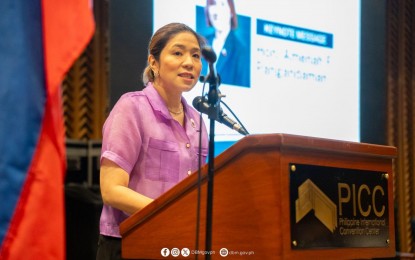
Budget Secretary Amenah Pangandaman (File photo)
MANILA – The Philippines has made significant strides in advancing women’s rights by ensuring that the national government is pushing gender equality in all aspects of development, Budget Secretary Amenah Pangandaman said Tuesday (Manila time).
Delivering the Philippines’ statement during the 68th Commission on the Status of Women (CSW68) General Discussion in New York, Pangandaman noted that Republic Act 9710 or the Magna Carta of Women, a comprehensive anti-discrimination and gender-equality law, was further operationalized and translated into “meaningful and targeted” outcomes through the Gender Equality and Women’s Empowerment (GEWE) Plan 2019-2025.
Pangandaman said the GEWE Plan 2019-2025 serves as the Philippine government’s guide in formulating Gender and Development (GAD) plans and budgets, adding that the country was able to spend an estimated USD18.9 billion on gender programs in 2022.
She added that all government agencies have been allocating at least five percent of their budget to support programs and activities on GEWE since 1995, as part of the country’s commitment to “financing with a gender perspective”.
A high percentage of GAD budget in relation to the total agency budget is one of the indicators of the depth of gender mainstreaming within the agency.
It reflects that the agency is not only implementing direct GAD programs, activities, and projects (PAPs) but also actively integrating gender perspectives throughout its planning and programming processes.
Leadership, political participation
Pangandaman said Filipino women play a crucial role in the country's politics, citing the key positions they hold in government.
“We continually celebrate women leaders in the country’s governance. The Philippines has the distinction of having had two female Presidents, while our present Cabinet has five female Secretaries, including yours truly,” Pangandaman said.
She is the only female member of President Ferdinand R. Marcos Jr.’s economic team and the second woman to hold the position of Budget secretary.
Pangandaman stressed the women’s vital role in the peacebuilding and development process of the Bangsamoro Autonomous Region in Muslim Mindanao, which is home to Bangsamoro tribes, Indigenous Peoples, and settler communities in the southern part of the Philippines.
“We established the Bangsamoro Women Commission, the body responsible for mainstreaming gender into the implementation of the Bangsamoro Organic Law, thereby ensuring the meaningful participation of women in decision-making at all levels of governance,” she said.
Social protection, financial inclusion
As the Budget chief, Pangandaman said she has undertaken “intersectoral and all-encompassing” initiatives to address the poverty experienced by women and girls in the Philippines.
“Through collaborative efforts and targeted interventions, we are determined to break the chains of poverty and empower them at all levels,” she said.
Pangandaman added that the Philippine government has mainstreamed gender into social protection initiatives through the Pantawid Pamilyang Pilipino Program (Bridging Program for the Filipino Family) or 4Ps, which is a conditional cash transfer program of the Philippine government under the Department of Social Welfare and Development.
“We continue to strengthen our institutions and social protection programs to address women’s poverty. Our Pantawid Pamilyang Pilipino Program, a conditional cash transfer program with a budget that has exponentially increased from USD5.37 million in 2008 to USD1.9 billion this 2024, has benefitted 4.4 million Filipino households,” Pangandaman said.
She noted that cash grants under the 4Ps are given directly to mothers of eligible households to “[increase] their ability to invest in the well-being of their families, thereby improving the survival, health, and access to education of their children.”
The government is also committed to helping women improve their business skills by giving them access to business financing through programs such as Kapatid Mentor Me program, which offers women entrepreneurs coaching and mentoring, as well as government loans to promote women-led micro, small, and medium enterprises as “the driving force of the Philippine economy.”
Pangandaman added that the government is working hard to incorporate gender-responsive measures in the country’s climate action programs, considering the vulnerabilities of women during disasters.
More to be done
She, however, acknowledged that more needs to be done to attain a “genuinely inclusive and gender-fair Philippines and (the) world”.
“But this should only motivate us to continue to rise above the limitations we have experienced in the past and—in the true spirit of equality—make our voices even louder to achieve a future of empowered women and girls in a gender-equal world,” Pangandaman said.
Pangandaman heads the Philippine delegation to represent the country at the CSW68 at the United Nations (UN) Headquarters in New York.
The CSW is the UN's largest annual gathering that aims to address women’s issues and concerns including discrimination and violence against women, and promote gender equality, and female empowerment.
This year’s CSW will be held from March 11 to 22 with the priority theme, “Accelerating the Achievement of Gender Equality and the Empowerment of All Women and Girls by Addressing Poverty and Strengthening Institutions and Financing with a Gender Perspective”.
This year’s CSW is chaired by the Philippines through the Permanent Representative of the Republic of the Philippines to the UN Antonio Lagdameo. (PNA)
